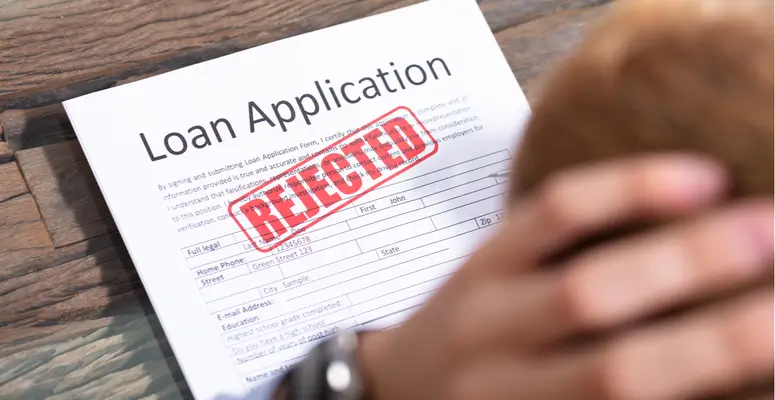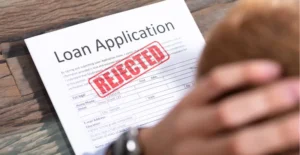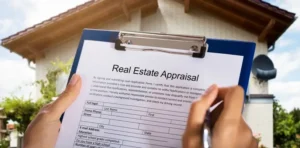Having your VA loan denied can feel like a major setback—especially after serving your country and earning well-deserved benefits.
But a “VA loan credit denial” isn’t the end of the road.
Between credit repair strategies, understanding lender requirements, and leveraging VA resources, there are plenty of ways to regroup and get back on track.
This comprehensive guide will show you how to improve credit for a VA loan, highlight the underwriting factors that go beyond just a credit score, and explore alternative financing if you need extra time to qualify.
In this Article
Why Are VA Loans Denied?
VA loans are lenient compared to many other mortgage products, yet certain “VA loan denial reasons” still exist. Lenders weigh factors such as credit score, employment history, debt-to-income (DTI) ratio, residual income, and asset reserves. While the VA itself doesn’t set a strict minimum credit score, most lenders expect scores of at least 580–620. If your score falls below that, you’re at higher risk for denial. A history of late payments, bankruptcy, or foreclosure can also signal potential financial instability.
- Residual Income: This is the money left over each month after all major expenses are paid. The VA has guidelines to ensure you can comfortably afford your mortgage along with other financial obligations.
- Employment History and Asset Reserves: Lenders want to see steady employment or reliable sources of income. Having savings or other assets in reserve demonstrates financial cushioning, making you less risky to lend to.
Understanding the Underwriting Process for VA Loans
The underwriting process for VA loans goes beyond simply checking a credit score. In most cases, lenders use an automated underwriting system (AUS) first. If the AUS flags any concerns—like high DTI or limited credit history—your application may move to manual underwriting. Manual underwriters look deeper into your credit report, payment patterns, and overall financial profile.
Here’s what underwriters typically examine:
- Payment History: On-time payments show responsibility, whereas a history of missed or late payments raises red flags.
- Credit Utilization: Using less than 30% of your available credit is generally viewed positively.
- Derogatory Marks: Bankruptcies, foreclosures, and collections all weigh into the underwriting decision.
- Overall Financial Stability: Consistent employment, minimal new debt, and adequate asset reserves can offset lower credit scores.
During manual underwriting, your VA-approved lender may ask for additional documents explaining any negative items. Demonstrating that past issues were temporary—such as deployment-related credit hiccups—can help strengthen your case.
Common Credit Challenges Veterans Face
Military members often deal with unique circumstances that can affect their credit:
- Deployment-Related Late Payments: Deployments can interrupt normal bill-paying routines. Accounts left unmanaged may fall behind, leading to negative marks on your credit report.
- Security Clearances and Credit: Financial stress can jeopardize certain clearances. Some service members worry about seeking help because they fear it might affect their security status. However, proactive credit management is usually viewed more favorably than ignoring problems.
- Frequent Relocations: Moving often can result in missed bills or confusion with addresses, leading to discrepancies on credit reports.
Addressing these hurdles early can improve your overall financial outlook and reduce the risk of a “bad credit VA loan” denial.
How Credit Issues Impact VA Loan Approval
Your credit score is a snapshot of your financial trustworthiness. While the VA doesn’t officially mandate a minimum score, most lenders do. And while some VA lenders can approve scores of 580, typically a credit score under 620 may lead to a “VA loan denied” status unless you have compensating factors like a low DTI or robust savings.
Debt-to-Income Ratio (DTI): Most lenders prefer a DTI of 41% or lower. If yours is higher, underwriters may worry about your ability to manage monthly mortgage payments alongside existing debts.
Employment History: Gaps in employment or frequent job changes can raise concerns about income stability, particularly if they’re not service-related. Providing documentation that supports your transitions—especially if they’re tied to military service—can ease underwriter worries.
Asset Reserves: Savings or assets in reserve can counterbalance lower scores, indicating you can handle unexpected financial emergencies. Demonstrating strong reserves often boosts lender confidence.
Specific Credit Repair Strategies for Veterans
Wondering “how to get a VA loan with bad credit”? It often starts with targeted credit repair tailored to military life:
- Dispute Deployment-Related Errors: If missed payments occurred while you were deployed, provide documentation (orders, leave paperwork) and dispute inaccuracies with the credit bureaus. For information on disputing, visit the Consumer Financial Protection Bureau (CFPB).
- Set Up Automatic Payments: To avoid missed bills during deployments or relocations, schedule auto-pay for recurring expenses like credit cards, utilities, and loans.
- Monitor Your Credit Report: Frequent relocations can lead to errors in personal information and addresses. Check your reports regularly at AnnualCreditReport.com.
- Address Collection Accounts: Consider “pay-for-delete” agreements where possible. Get the removal terms in writing before sending any payment.
- Seek Help from VA Financial Counselors: The VA partners with housing counselors who understand military finances. They can create a budget, offer debt management plans, and guide you toward improving credit.
Alternative Financing Options If You Can’t Qualify Right Away
Sometimes it takes time to overcome “VA loan denial reasons.” If your credit needs extensive repair, you might explore these short-term alternatives:
- FHA Loans: These loans often have lower credit score requirements (as low as 580) and allow higher DTIs. However, you’ll pay mortgage insurance premiums (MIP).
- Conventional Loans with Down Payment Assistance: Some state and local programs offer grants or low-interest second mortgages for down payments. Conventional loans typically require at least a 620 score, though.
- Rent-to-Own Arrangements: If homeownership is urgent, a rent-to-own contract can buy you time to build credit while partially applying rent to a future purchase.
| Factor | VA Loan | FHA Loan | Conventional Loan |
|---|---|---|---|
| Minimum Credit Score | 580–620 (lender-dependent) | 580 (for 3.5% down) | 620–680 |
| Down Payment | 0% | 3.5% | 3–20% |
| Mortgage Insurance | No monthly MIP (VA funding fee applies) | Monthly MIP + Upfront fee | PMI if under 20% down |
| Waiting Period After Bankruptcy | 2 years (Chapter 7); 1 year (Chapter 13) | 2 years (Chapter 7); 1 year (Chapter 13) | 4–7 years |
| DTI Limit | ~41% (flexible with strong credit) | ~43–50% | ~43% (may vary) |
Steps to Rebound from a VA Loan Denial
If you’ve encountered a “VA loan credit denial,” here’s how to bounce back:
- Review Your Credit Reports: Look for errors and dispute them. Even a small correction can raise your score significantly.
- Pay Down Debt: High balances hurt both your credit score and DTI. Focus on reducing credit card balances below 30% of your limit.
- Establish Positive Credit History: If your file is thin, use a secured card or credit-builder loan. Consistent, on-time payments matter most.
- Address Collections: Negotiate pay-for-delete when possible. Get agreements in writing before paying to ensure removal.
- Work with a Specialized Lender: Some lenders cater to veterans with less-than-perfect credit. They understand military pay structures and unique credit challenges.
- Consider a Co-Borrower: A spouse or family member with stronger credit can improve your loan approval odds. Just be mindful of their debts as well.
- Be Patient: Major credit issues like bankruptcy or foreclosure take time to overcome. Use waiting periods to rebuild credit and save.
How Long Does It Take to Improve Credit for a VA Loan?
The timeline to “improve credit for a VA loan” varies by individual circumstances. Small issues may be resolved in as little as 3–6 months, while severe derogatory marks (like bankruptcy) can take 1–2 years. Here’s a quick look at potential timelines:
| Action | Timeframe | Potential Score Increase |
|---|---|---|
| Dispute Credit Report Errors | 30–60 Days | 20–100 points |
| Pay Down Card Balances | 1–2 Months | 10–50 points |
| Remove Collections | 1–3 Months | 50–100 points |
| Build New Credit (Secured Card) | 6–12 Months | 10–20 points |
| Consistent On-Time Payments | 3–6 Months | 10–30 points |
Can You Appeal a VA Loan Denial?
If you believe an error or misunderstanding caused the denial, ask the lender about your options. Sometimes, submitting additional documentation—like deployment orders explaining late payments—can lead to an approval upon review. For official guidance, consult the Department of Veterans Affairs or consider speaking with a VA loan specialist.
Emotional and Financial Impact of a VA Loan Denial
A “VA loan denied” situation can be emotionally exhausting. You’ve served your country, and it’s disheartening to be turned away for a mortgage. Financially, a denial can also mean lost appraisal or inspection fees. But remember: denial isn’t permanent. With the right steps—credit repair, possibly waiting a few months, and exploring alternative financing—you can turn things around. As John Smith, a senior VA loan officer, says, “A denial simply means ‘not yet approved.’ With some work, most veterans can qualify.”
VA Programs to Help with Credit Issues
The VA aims to help veterans achieve financial stability. If you’re struggling to qualify, look into:
- VA Financial Counseling: The VA offers free or low-cost counseling to veterans facing monetary challenges, helping you budget and plan for future homeownership.
- Home Loan Technicians: Reach out to a VA Regional Loan Center to speak with a technician who can guide you through specific issues, including credit barriers.
- Adaptive Housing Grants: If you qualify for certain disability-related grants, you may reduce overall housing costs, easing your financial burden and improving loan approval odds.
Common Mistakes to Avoid
- Applying Too Soon: Hard inquiries can lower your score. Reapply only when your credit is stronger.
- Ignoring Small Debts: Even a small collection can scare lenders.
- Maxing Out Cards: High credit utilization is a red flag to underwriters.
- Skipping Expert Help: VA-approved lenders, certified credit counselors, or nonprofit financial advisors can streamline your journey.
People Also Ask (FAQs)
What credit score is needed for a VA loan?
The VA doesn’t set a minimum, but most lenders want at least 580–620. Scores below 580 may qualify if you have compensating factors.
How do I improve my credit quickly for a VA loan?
Paying down high credit card balances and disputing credit report errors can raise your score in as little as 30–60 days.
Does a VA loan denial harm my credit score?
The denial itself doesn’t impact your score, but the hard inquiry from your application can lower it by about 5–10 points.
How can I appeal a VA loan denial?
If you think you were wrongfully denied, ask the lender to reconsider. Provide additional documentation or seek help from a VA Regional Loan Center.
Are there grants or programs for veterans with bad credit?
Yes. The VA provides housing counselors, while nonprofits like HUD-approved agencies offer free or low-cost credit repair and budgeting advice.
The Bottom Line
A “VA loan denied” letter doesn’t have to end your journey toward homeownership. By addressing underlying credit issues—whether caused by deployment, financial missteps, or insufficient credit history—you can significantly improve your “VA loan credit requirements” profile and qualify for a mortgage. From working with VA-approved lenders who understand your unique military situation to exploring alternative financing and credit repair resources, the path forward is clear. The key is patience, consistent effort, and the willingness to use all available tools—from financial counseling to secured credit cards. Take the next step and secure the home you and your family deserve.
Ready to take action?
- Check your credit report at AnnualCreditReport.com.
- Apply with a VA lender who specializes in bad credit VA loans, or reach out to a
- VA financial counselor for personalized guidance.
You’ve served your country—now let’s work together to ensure you enjoy the benefits you’ve earned.


















